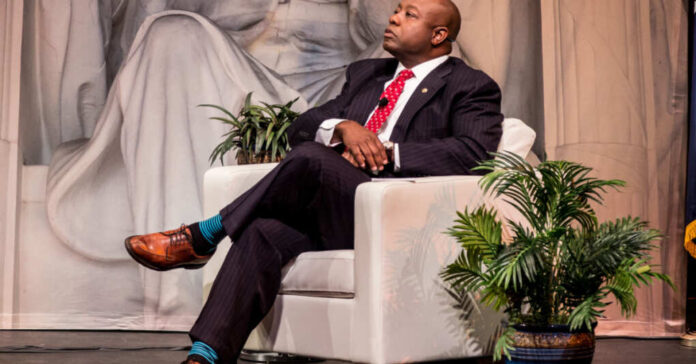
With only 3% of Republican voters choosing South Carolina Tim Scott as their favored candidate, it’s tempting to overlook him in the GOP presidential candidate’s arena. But recent polls found that 12% of Republicans hold him as their second-choice candidate, up from 3% in April and marking the sharpest rise of support among all GOP contenders.
Scott is a nightmare for Democrats. His story as a political candidate of color is a true rags-to-riches tale, and his belief that race is not a deciding factor in determining any American’s outcome is a welcome break from the fatalistic liberal narrative.
“I can go as high as my character, my education, and my perseverance will take me,” Scott said during a speech at Drake University. “I bear witness to that. I testify to that.”
To encourage Black voters to break from the Democratic party, Scott frequently accuses Democrats of weaponizing race to divide Americans, “not for race, for power.”
“I think having candidates like Joe Biden say that ‘You can’t be Black if you don’t vote for me’ is a part of the unfortunate and intended pressure on minority voters to stay a part of what is perceived by the radical progressives as their voters,” Scott explained in a USA Today interview.
Scott takes every opportunity to contrast his views from Democrats. He took on The View when they accused Republicans of enacting policies that “hurt people of color,” and he stood against former president Barack Obama’s claim that Black Republicans “downplay racial inequality.”
But according to a recent survey, only 39% of Black Republicans believe that most things that happen to Black people in America will directly impact their lives. Conversely, 57% of Black Democrats believe that everything that happens in Black America will influence their personal lives.
Additionally, the majority of Black Republicans believe that they are responsible for their own fate and ability to “get ahead.”
Kiana Cox, Pew Research Center Associate, responded to the results of the survey. “By and large, we see that Black Republicans, when we look at their views on racial issues, they tend to have a more individualistic approach when it comes to assessing racial inequality and when it comes to offering remedies for that inequality.”
More Black Republicans are allowing themselves to take credit for their own victories. Winsome Sears, Virginia’s Lieutenant Governor, was the first Black woman to win the statewide election. Sears downplayed her success in shattering the “glass ceiling.”
In 2021, Sears told USA Today, “So I make history. So what? It’s done. Now what the people want to know is: How are you going to govern? What are your policies? What are your issues? How are you going to serve us? Because that’s what this is about.”
Sears’ take on the role of race in success is at direct odds with other prominent women of color, notably Vice-President Kamala Harris. Harris is determined to widen the artificial racial divide, even as she agreed with Scott during a 2021 interview that America is not a racist country.
“Well, first of all — no, I don’t think America is a racist country,” Harris admitted on Good Morning America, “But we also do have to speak the truth about the history of racism in our country and its existence today.”
Despite the Democratic rhetoric, support among Black voters for conservative candidates is growing faster than liberals would like. Last year, GOP candidates saw an increase in the Black vote to 14%, marking a sharp increase over 2018’s 8%.
Republican Daniel Cameron, currently running to be Kentucky’s first Black governor in 2023, said the trends “reflect a reaction among Black voters to the Democratic Party,” which he said has been “captured by far-left ideas.” Cameron told USA Today, “I think Black people, particularly Black men, are growing to see that the Republican Party is more in line with their values.”
Thank you, Kentucky, for the opportunity to serve as your Attorney General.
I recognize the significance of this moment, and I hope that it propels men and women who look like me to answer the call of public service, regardless of their political affiliation. pic.twitter.com/inQkvFOKVm
— Attorney General Daniel Cameron (@kyoag) January 6, 2020
Scott agrees. “I think minority voters are trending toward the Republican Party. That’s great news.”
Scott will not find it easy to win over Black voters, however, unless he takes the debate directly to their communities. As it stands, Scott’s debates on race happen in front of white audiences.
Johns Hopkins historian Leah Wright Rigueur has studied Black Republicans. She believes that even conservative Black voters judge Black Republican candidates harshly, pointing out that voters take notice of how Republican candidates of color frequently avoid “delivering messages in their communities and political spaces.”
Scott is off to a great start, but he needs to take his fight out of the political arena and straight to the communities and voter base he needs. In the meantime, however, Scott is quietly poised to take on his opponents, both Republican and Democrat alike.
Thankful for those who stand next to me both on and off the stage. pic.twitter.com/pJLK9tlRDn
— Tim Scott (@votetimscott) July 12, 2023











